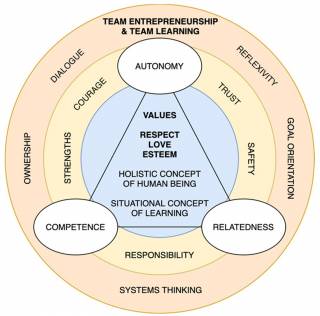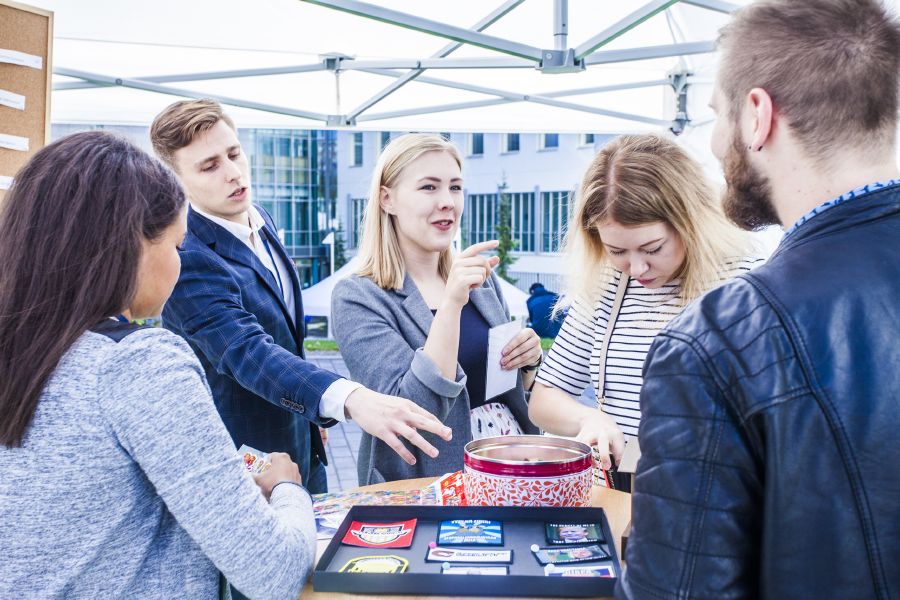Introduction
TAMKjournal | TAMK Proakatemia is a learning community with an innovative team-based approach to entrepreneurship education called team learning, or experiential action learning (Arpiainen, 2019). Initially, the team learning approach in Proakatemia was based on the method developed by Johannes Partanen for Tiimiakatemia in Jyväskylä University of Applied Sciences. Still, during the more than 20 years of operation, Proakatemia has developed its own ways of operating. Below is an attempt to outline the basic operating principles of Proakatemia based on philosophical, educational, and psychological theory and years of practical experience of team coaching and learning.
Operating principles
Leadership, management, and processes in TAMK Proakatemia are based on continuously developing knowledge base on learning organization (for example, Nonaka & Takeuchi’s model of knowledge creating company (1995) and Senge’s theory of learning organization (2006)), as well as experience gained in practice and knowledge gained through research. Team Entrepreneurs have a central role in developing Proakatemia structures, strategic leadership, and managing the community.
In the heart of pedagogy and curriculum in Proakatemia is the Path to Entrepreneurship, initially developed in 2007:
- Trust,
- Courage,
- Doing,
- Learning and
- Success
The values on the path are seen in connection with team entrepreneurship and the Proakatemia community. A strong team and Proakatemia community provide the best means for educating individuals and supporting the development of their unique personal strengths and capabilities.
The core ways of relating to others in Proakatemia are what can be called recognitional attitudes (Honneth 1996; Laitinen 2012):
Respect, which means acknowledging the other as a uniquely valuable person who has the right to autonomy and worthwhile goals that can intertwine with our own goals – becoming our shared goals. To achieve autonomy, individuals need support from others, the community and the team. Respect as a recognitional attitude is a necessary condition for the development of self-respect in individuals.
Love, which here means loving care for others and their best potential. Love as a recognitional attitude means that we wish to see others as their best possible selves and are also ready to work towards that end. Love as a recognitional attitude is a necessary condition for the development of confidence in individuals.
Esteem means taking a respectful attitude towards the achievements of others and their work for the common good. Esteem as a recognitional attitude is a necessary condition for the development of self-esteem and professional identities in individuals.
Recognitional attitudes are necessary for developing individual identities (including, for example, entrepreneurial and professional identities) and active agency. In Proakatemia, the task of a Team Coach is to act as an example of these recognitional attitudes and, at the same time, actively facilitate them in the Team Entrepreneurs’ relationships with each other.

Figure 1 The dynamic model of Proakatemia operating principles.
Figure 1 illustrates the philosophical, psychological, and practical principles in the core of Proakatemia operating principles. The innermost blue circle illustrates the philosophical principles related to the worldview in Proakatemia. It includes the shared values that support sustainable entrepreneurial learning and agency, recognitional attitudes of respect, love and esteem that define the relationships between people in Proakatemia, a holistic concept of human being, as well as the situational concept of learning which emphasizes the connection between learning and life situations where we are and participate as active agents and where we shape our world together with others (Anttila, Pohjola, Löytönen & Kauppila 2017).
The yellow circle illustrates the psychological operating principles of Proakatemia, which include the central motivational factors in the self-determination theory of motivation (Deci & Ryan 2000; Ryan & Deci 2020), experiences of autonomy, competence and relatedness. These psychological motivational factors and trust and courage are connected with recognitional attitudes as the basis for the individual and collective agency. Team coaching in Proakatemia begins with building trust and a sense of psychological safety. It emphasizes the responsibility of each Team Entrepreneur over their actions and facilitates courage and focus on continuously developing personal and team strengths.
The outermost orange circle illustrates the action principles in Proakatemia, where the primary ones are team entrepreneurship and team learning. These primary principles in action are supported by team reflexivity (Decuyper, Dochy & van den Bossche 2010) and dialogue (Isaacs 1999), goal orientation, systems thinking (Senge 2006) and Team Entrepreneurs’ ownership over their team enterprise as well as most of the communal activities in Proakatemia.
In practical activities, it is also essential to leave enough room for reflection and dialogue. In Proakatemia, the individual and collective reflection is supported by the following team learning practices:
- Coaching conversations
- Reading and writing essays
- Project feedback (checkpoints, retrospectives)
- Training sessions and dialogue
- Cabin-In-The-Woods sessions
- Board of Leaders for the team and Proakatemia community
- Proakatemia Days
The impact of reflection and dialogue is repeatedly tested in practical collaboration in customer projects, various team challenges (Team Deal, Sales Days, 24H, Final Camp project), leading the team, and developing its business activities. Actions and, especially, joint actions speak more loudly about the team’s reality than mere words.
Studying in Proakatemia is possible only as a member of a team.
Continuous dialogue and collaboration (working together) in customer projects, team challenges, and leading the team form a cycle of developing understanding and interpretation that leads to transformative learning and growth. Celebrating the successes in diverse challenges and completing processes together is essential for developing professional identities and the spirit of the whole community.
Team entrepreneurship
In Proakatemia, studies are pursued in a team. Students in Proakatemia commit themselves to work as Team Entrepreneurs in teams formed by Team Coaches that consist of 10–20 students each. Committing to a team for the duration of studies in Proakatemia is a crucial part of the learning process, which includes working in a professional and responsible manner even in the middle of tensions inherent in teamwork. It is important for Team Entrepreneurs to learn how to connect their personal goals with those of the whole team and to support, help and encourage others in working towards the shared goals. Studying in Proakatemia is possible only as a member of a team.
Team learning
Team learning is a collective capability of a team, acquired through continuous disciplined and reflective practice, which helps the team succeed – to achieve the valuable goals that the team has set for its activities (Senge 2006). Besides their own learning process, the Team Entrepreneurs are responsible for supporting and encouraging each other’s learning and professional and entrepreneurial growth. The end result of team learning depends on how committed the Team Entrepreneurs are to the activities of the team and the community and their continuous development.
Proakatemia follows the degree regulations of Tampere University of Applied Sciences and other regulations and guidelines set by the university of applied sciences. The objectives of degree studies in Proakatemia are based on the levels 6 (for bachelor level studies) and 7 (for master level studies) in Finnish National Qualification Framework (FiNQF), which is based on the European Qualification Framework (EQF) (Finnish National Agency for Education n.d.). Besides professional knowledge, skills and competencies, team entrepreneurship and team learning develop the capacity of individuals to lead complex professional projects and other activities and make decisions concerning themselves and others in changing work environments. During their studies, Team Entrepreneurs take responsibility for supporting other team members’ professional development alongside developing their own professional competencies. In addition to developing their own lifelong learning capabilities, the Team Entrepreneurs build the capacity of their whole work community to support lifelong learning.
The role of a Team Coach in Proakatemia
Teaching staff in Proakatemia work as Team Coaches (Partanen 2012). The primary task of a Team Coach is to help Proakatemia and the team develop as learning organizations and support the Team Entrepreneurs’ professional and personal growth as members of the team. For Team Entrepreneurs, the team enterprise with its processes and tensions is the main framework of learning and a supportive community. A strong team is a requirement for individual learning and growth in Proakatemia.
A strong team is a requirement for individual learning and growth in Proakatemia.
The Team Coaches’ task is, in all their activities, to be an example of following Proakatemia’s values and of directing attention towards that which has value, to maintain a safe atmosphere conducive to learning together, and to challenge and encourage the team and the Team Entrepreneurs to train and use their best potential. The Team Coach opens and gives the Team Entrepreneurs space to be visible and to act courageously to create value for the community and the team. In addition, the Team Coaches need to fulfil all the teaching-related and administrative responsibilities that the university has set for the teaching staff (Tampere Universities 2021).
We hope that this short account of operating principles in TAMK Proakatemia based on both theory and years of collective and personal experience is of value to anyone who wishes to develop new team-based or action-oriented approaches to higher education.
References
Anttila, E., Pohjola, H., Löytönen, T., & Kauppila, H. 2017. Ihmis- ja oppimiskäsitykset taideopetuksessa. 10138/185061. Read on 1.12.2021. https://taju.uniarts.fi/handle/10024/7086
Arpiainen, R.-L. 2019. Tiimityötä, toimintaa ja tunteita – näkökulmia yrittäjyyskasvatuksesta ja yrittäjämäisestä oppimisesta kokemuksellisen toimintaoppimisen viitekehyksessä. Aalto University. Read on 1.12.2021. https://aaltodoc.aalto.fi:443/handle/123456789/37108
Deci, E. L., & Ryan, R. M. 2000. The “What” and “Why” of Goal Pursuits: Human Needs and the Self-Determination of Behavior. Psychological Inquiry, 11(4), 227–268. Read on 1.12.2021. https://doi.org/10.1207/S15327965PLI1104_01
Decuyper, S., Dochy, F., & Van den Bossche, P. 2010. Grasping the dynamic complexity of team learning: An integrative model for effective team learning in organizations. Educational Research Review, 5(2), 111–133. Read on 1.12.2021. https://doi.org/10.1016/j.edurev.2010.02.002
Finnish National Agency for Education. n.d. Qualifications Frameworks. Read on 1.12.2021. https://www.oph.fi/en/education-and-qualifications/qualifications-frameworks
Honneth, A. 1996. The struggle for recognition: The moral grammar of social conflicts. Cambridge, MA: MIT Press.
Isaacs, W. 1999. Dialogue: The Art Of Thinking Together. New York, NY: Currency.
Laitinen, A. 2012. Social bases of self-esteem: Rawls, Honneth and beyond. Nordicum-Mediterraneum, 7(2). Read on 1.12.2021. https://doi.org/10.33112/nm.7.2.2
Nonaka, I., & Takeuchi, H. 1995. The Knowledge-Creating Company: How Japanese Companies Create the Dynamics of Innovation. Oxford: Oxford University Press.
Partanen, J. 2012. Tiimivalmentajan parhaat työkalut. Partus.
Ryan, R. M., & Deci, E. L. 2020. Intrinsic and extrinsic motivation from a self-determination theory perspective: Definitions, theory, practices, and future directions. Contemporary Educational Psychology, 101860. Read on 1.12.2021. https://doi.org/10.1016/j.cedpsych.2020.101860
Senge, P. M. 2006. The Fifth Discipline: The Art & Practice of The Learning Organization (Revised & Updated edition). New York, NY: Doubleday.
Tampere Universities. 2021. TAMK’s Degree Regulations. Read on 1.12.2021. https://www.tuni.fi/studentsguide/handbook/tamk?page=2264
Authors
Timo Nevalainen is a Team Coach (Senior Lecturer, Entrepreneurship and Team Leadership) in TAMK Proakatemia. He is a member of Learning & Growth in Teams (LeGiT) research group in TAMK and is currently working as a specialist in a number of R&D&I projects on topics ranging from e-Coaching to supporting companies in recruiting international talents. (https://orcid.org/0000-0002-5407-7906 )
Mikael Lindell is a Team Coach (Senior Lecturer, Entrepreneurship and Team Leadership) in TAMK Proakatemia. He is currently working as TAMK Project Leader in Horizon Europe project FUSILLI and is a member of TAMK Circular & Bioeconomy research group. (https://orcid.org/0000-0002-5566-1215)
Ville Parkkila works as a part-time Team Coach in TAMK Proakatemia and as a Development Coach in Smart Work TAMK project, as well as a facilitator in a number of other R&D&I projects.
Photo: Jonne Renvall/University of Tampere

